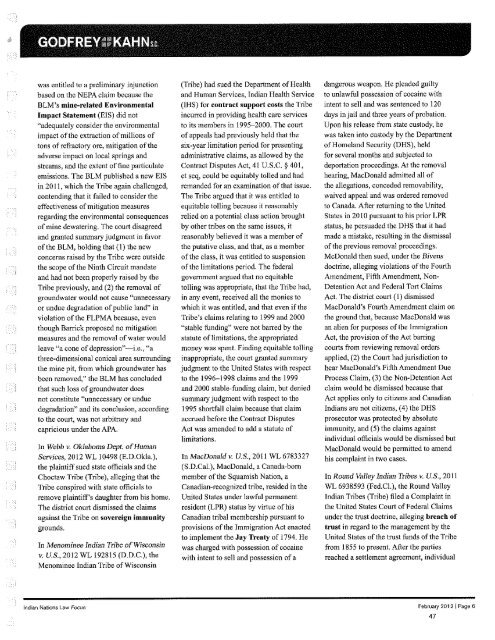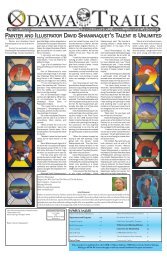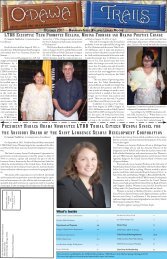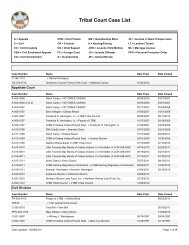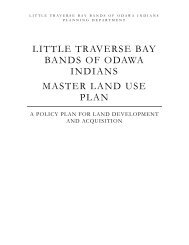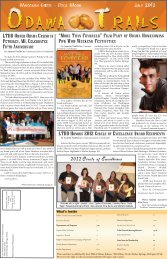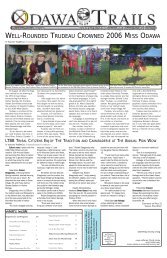United Tribes ) Michigan - Little Traverse Bay Bands of Odawa Indians
United Tribes ) Michigan - Little Traverse Bay Bands of Odawa Indians
United Tribes ) Michigan - Little Traverse Bay Bands of Odawa Indians
Create successful ePaper yourself
Turn your PDF publications into a flip-book with our unique Google optimized e-Paper software.
GU. DFREY2P KAHNsc<br />
was entitled to a preliminary injunction<br />
based on the NEPA claim because the<br />
BLM's mine-related Environmental<br />
Impact Statement (EIS) did not<br />
"adequately consider the environmental<br />
impact <strong>of</strong> the extraction <strong>of</strong> millions <strong>of</strong><br />
tons <strong>of</strong> refractory ore, mitigation <strong>of</strong> the<br />
adverse impact on local springs and<br />
streams, and the extent <strong>of</strong> fine particulate<br />
emissions. The BLM published a new EIS<br />
in 2011, which the Tribe again challenged,<br />
contending that it failed to consider the<br />
effectiveness <strong>of</strong> mitigation measures<br />
regarding the environmental consequences<br />
<strong>of</strong> mine dewatering. The court disagreed<br />
and granted summary judgment in favor<br />
<strong>of</strong> the BLM, holding that (1) the new<br />
concerns raised by the Tribe were outside<br />
the scope <strong>of</strong> the Ninth Circuit mandate<br />
and had not been properly raised by the<br />
Tribe previously, and (2) the removal <strong>of</strong><br />
groundwater would not cause "unnecessary<br />
or undue degradation <strong>of</strong> public land" in<br />
violation <strong>of</strong> the FLPMA because, even<br />
though Barrick proposed no mitigation<br />
measures and the removal <strong>of</strong> water would<br />
leave "a cone <strong>of</strong> depression"—i.e., "a<br />
three-dimensional conical area surrounding<br />
the mine pit, from which groundwater has<br />
been removed," the BLM has concluded<br />
that such loss <strong>of</strong> groundwater does<br />
not constitute "unnecessary or undue<br />
degradation" and its conclusion, according<br />
to the court, was not arbitrary and<br />
capricious under the APA.<br />
In Webb v. Oklahoma Dept. <strong>of</strong> Human<br />
Services, 2012 WL 10498 (E.D.Okla.),<br />
the plaintiff sued state <strong>of</strong>ficials and the<br />
Choctaw Tribe (Tribe), alleging that the<br />
Tribe conspired with state <strong>of</strong>ficials to<br />
remove plaintiff's daughter from his home.<br />
The district court dismissed the claims<br />
against the Tribe on sovereign immunity<br />
grounds.<br />
In Menominee Indian Tribe <strong>of</strong> Wisconsin<br />
v. U.S., 2012 WL 192815 (D.D.C.), the<br />
Menominee Indian Tribe <strong>of</strong> Wisconsin<br />
Indian Nations Law Focus<br />
(Tribe) had sued the Department <strong>of</strong> Health<br />
and Human Services, Indian Health Service<br />
(IHS) for contract support costs the Tribe<br />
incurred in providing health care services<br />
to its members in 1995-2000. The court<br />
<strong>of</strong> appeals had previously held that the<br />
six-year limitation period for presenting<br />
administrative claims, as allowed by the<br />
Contract Disputes Act, 41 U.S.C. § 401,<br />
et seq, could be equitably tolled and had<br />
remanded for an examination <strong>of</strong> that issue.<br />
The Tribe argued that it was entitled to<br />
equitable tolling because it reasonably<br />
relied on a potential class action brought<br />
by other tribes on the same issues, it<br />
reasonably believed it was a member <strong>of</strong><br />
the putative class, and that, as a member<br />
<strong>of</strong> the class, it was entitled to suspension<br />
<strong>of</strong> the limitations period. The federal<br />
government argued that no equitable<br />
tolling was appropriate, that the Tribe had,<br />
in any event, received all the monies to<br />
which it was entitled, and that even if the<br />
Tribe's claims relating to 1999 and 2000<br />
"stable funding" were not barred by the<br />
statute <strong>of</strong> limitations, the appropriated<br />
money was spent. Finding equitable tolling<br />
inappropriate, the court granted summary<br />
judgment to the <strong>United</strong> States with respect<br />
to the 1996-1998 claims and the 1999<br />
and 2000 stable-funding claim, but denied<br />
summary judgment with respect to the<br />
1995 shortfall claim because that claim<br />
accrued before the Contract Disputes<br />
Act was amended to add a statute <strong>of</strong><br />
limitations.<br />
In MacDonald v. U.S., 2011 WL 6783327<br />
(S.D.Cal.), MacDonald, a Canada-born<br />
member <strong>of</strong> the Squamish Nation, a<br />
Canadian-recognized tribe, resided in the<br />
<strong>United</strong> States under lawful permanent<br />
resident (LPR) status by virtue <strong>of</strong> his<br />
Canadian tribal membership pursuant to<br />
provisions <strong>of</strong> the Immigration Act enacted<br />
to implement the Jay Treaty <strong>of</strong> 1794. He<br />
was charged with possession <strong>of</strong> cocaine<br />
with intent to sell and possession <strong>of</strong> a<br />
dangerous weapon. He pleaded guilty<br />
to unlawful possession <strong>of</strong> cocaine with<br />
intent to sell and was sentenced to 120<br />
days in jail and three years <strong>of</strong> probation.<br />
Upon his release from state custody, he<br />
was taken into custody by the Department<br />
<strong>of</strong> Homeland Security (DHS), held<br />
for several months and subjected to<br />
deportation proceedings. At the removal<br />
hearing, MacDonald admitted all <strong>of</strong><br />
the allegations, conceded removability,<br />
waived appeal and was ordered removed<br />
to Canada. After returning to the <strong>United</strong><br />
States in 2010 pursuant to his prior LPR<br />
status, he persuaded the DHS that it had<br />
made a mistake, resulting in the dismissal<br />
<strong>of</strong> the previous removal proceedings.<br />
McDonald then sued, under the Bivens<br />
doctrine, alleging violations <strong>of</strong> the Fourth<br />
Amendment, Fifth Amendment, Non-<br />
Detention Act and Federal Tort Claims<br />
Act. The district court (1) dismissed<br />
MacDonald's Fourth Amendment claim on<br />
the ground that, because MacDonald was<br />
an alien for purposes <strong>of</strong> the Immigration<br />
Act, the provision <strong>of</strong> the Act barring<br />
courts from reviewing removal orders<br />
applied, (2) the Court had jurisdiction to<br />
hear MacDonald's Fifth Amendment Due<br />
Process Claim, (3) the Non-Detention Act<br />
claim would be dismissed because that<br />
Act applies only to citizens and Canadian<br />
<strong>Indians</strong> are not citizens, (4) the DHS<br />
prosecutor was protected by absolute<br />
immunity, and (5) the claims against<br />
individual <strong>of</strong>ficials would be dismissed but<br />
MacDonald would be permitted to amend<br />
his complaint in two cases.<br />
In Round Valley Indian <strong>Tribes</strong> v. U.S., 2011<br />
WL 6938593 (Fed.Cl.), the Round Valley<br />
Indian <strong>Tribes</strong> (Tribe) filed a Complaint in<br />
the <strong>United</strong> States Court <strong>of</strong> Federal Claims<br />
under the trust doctrine, alleging breach <strong>of</strong><br />
trust in regard to the management by the<br />
<strong>United</strong> States <strong>of</strong> the trust funds <strong>of</strong> the Tribe<br />
from 1855 to present. After the parties<br />
reached a settlement agreement, individual<br />
February 2012 1 Page 6<br />
47


